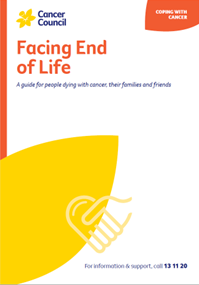- Home
- Cancer Information
- Advanced cancer
- Facing end of life
- Emotional and spiritual needs
- Coping with change and loss
Coping with change and loss
Finding a way to cope with knowing you are dying can depend on many factors, including your age, whether or not you have children, your relationships with a partner or family members, and your cultural or spiritual beliefs. It may also depend on how your family and friends cope with the news.
Learn more about:
Overview
Everyone will find their own way to deal with the knowledge that they are dying, and at their own pace. There is no right or wrong way.
For some people, learning more about the physical process of dying can make it easier to cope. Others find it helps not to think too far ahead, but to focus on a month, a week or even a day at a time.
Finding hope
When you’ve been told that you’re dying with cancer, you may find it hard to feel hopeful. While it may no longer be realistic to hope for a cure, you can find hope in other things, such as sharing some special times with those you love.
Studies of people dying with cancer show that people’s hope can be maintained when their health professionals:
- involve them in decision-making, especially about palliative treatment options and where they would like to die
- reassure them that any pain and other symptoms will be well controlled.
Finding a balance between knowing that you are dying and still trying to live as fully as possible is sometimes called “living with dying”. This may mean focusing more on the present. You may find that some days it’s easier to achieve this than others.
Maintaining a sense of control
When you’re approaching the end of life, you may feel like you’ve lost control. One way to feel more in control is to make decisions about your current and future health care and medical treatment, and to record your preferences in advance care paperwork.
Loss and grief
Other losses and changes happen throughout a terminal illness – loss of work, loss of social roles, loss of friendships, loss of connection to community, and loss of independence. You will probably find it helpful to spend time grieving for these losses.
You might also experience preparatory grief, which means reacting to the impending loss of your life. You may grieve for events that you won’t be around for, such as marriages, graduations and new babies in the family. If you don’t have a partner or children, you may mourn the lost opportunity to have these relationships or experiences. You can also grieve for small pleasures such as not being able to have a morning cup of coffee or go for a walk in the park.
Gradually, you may feel less able to do things or you may lose interest in activities you previously enjoyed. For many people, this is a natural part of coming to terms with death. It may make you feel sad and very low, but you may also move towards a sense of peace.
→ READ MORE: Spirituality at the end of life
People saying ‘You’ll get well’ makes me really cross. I know I won’t get well. I want to say, ‘I am going to die and don’t you dare deny me this business of dying’.
Catherine
Podcast: Living with Dying
Listen to more episodes of our podcast for people affected by can
More resources
Prof Jane Phillips, Head, School of Nursing and Professor, Centre for Healthcare Transformation, Queensland University of Technology and Emerita Professor Palliative Nursing, University of Technology Sydney, NSW; Prof Meera Agar, Palliative Care Physician, Professor of Palliative Medicine, University of Technology Sydney, IMPACCT, Sydney, NSW; Sandra Anderson, Consumer; A/Prof Megan Best, The University of Notre Dame Australia and The University of Sydney, NSW; Prof Lauren Breen, Psychologist and Discipline Lead, Psychology, Curtin University, WA; David Dawes, Manager, Spiritual Care Department, Peter MacCallum Cancer Centre, VIC; Rob Ferguson, Consumer; Gabrielle Gawne-Kelnar, Counsellor, Psychotherapist and Social Worker, One Life Counselling & Psychotherapy, NSW; Justine Hatton, Senior Social Worker, Southern Adelaide Palliative Services, Flinders Medical Centre, SA; Caitlin MacDonagh, Clinical Nurse Consultant, Palliative Care, Royal North Shore Hospital, Northern Sydney Local Health District, NSW; McCabe Centre for Law and Cancer; Palliative Care Australia; Belinda Reinhold, Acting Lead Palliative Care, Cancer Council QLD; Xanthe Sansome, National Program Director, Advance Care Planning Australia; Kirsty Trebilcock, 13 11 20 Consultant, Cancer Council SA.
View the Cancer Council NSW editorial policy.
View all publications or call 13 11 20 for free printed copies.
Need to talk?
Support services
Coping with cancer?
Speak to a health professional or to someone who has been there, or find a support group or forum
Cancer Council Online Community
A community forum – a safe place to share stories, get tips and connect with people who understand
Cancer information
Emotions and cancer
Learn about the range of emotions you may experience if you are affected by cancer
Advanced cancer
Information for all stages of advanced cancer, from the initial diagnosis to palliative care and grief

